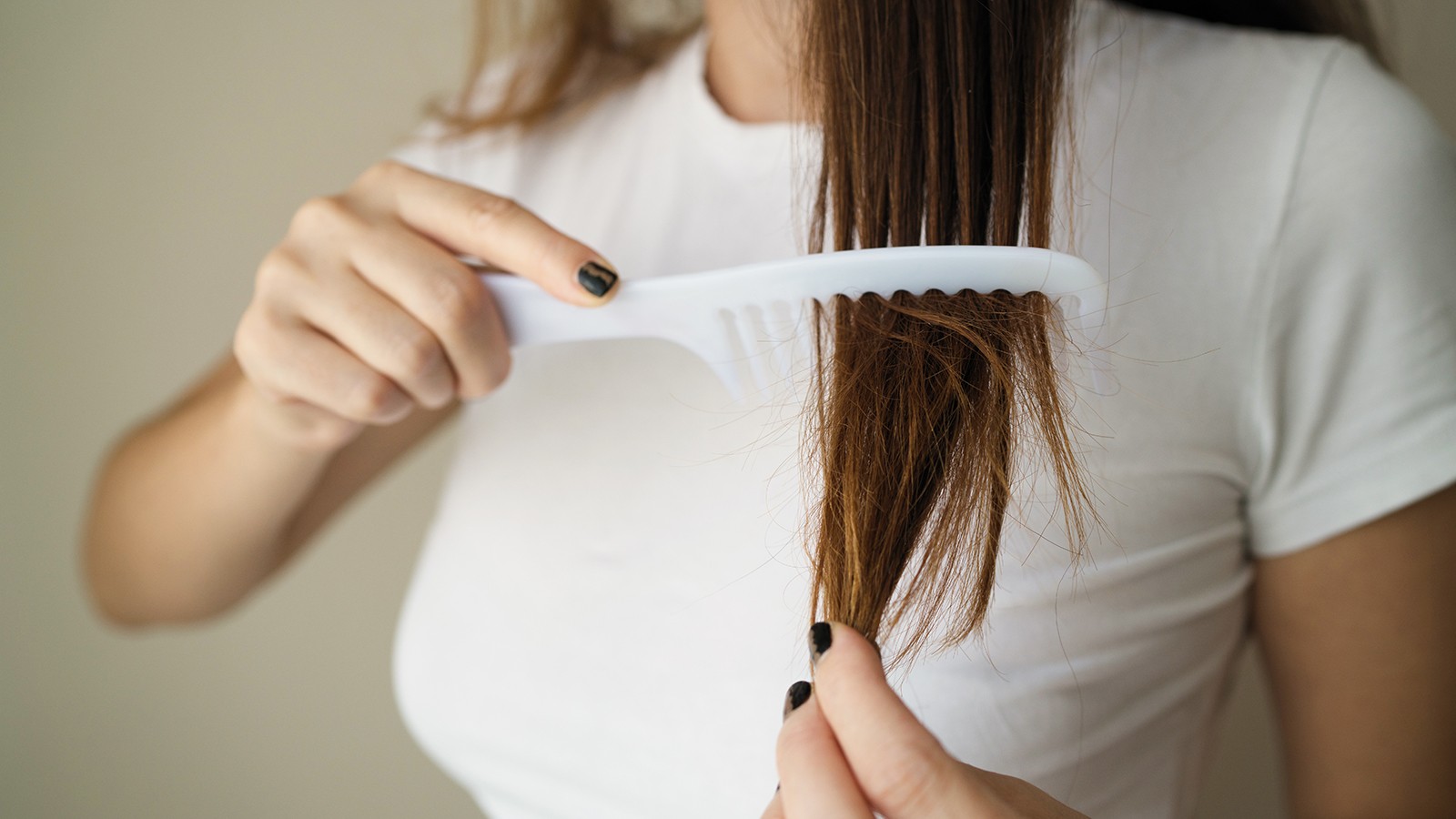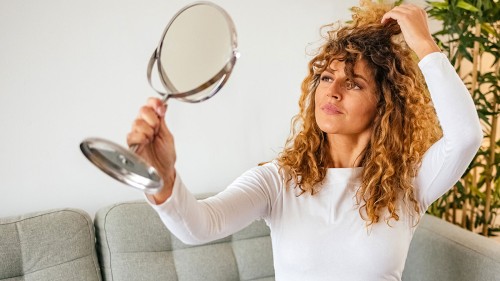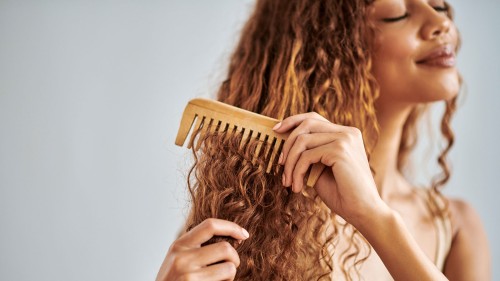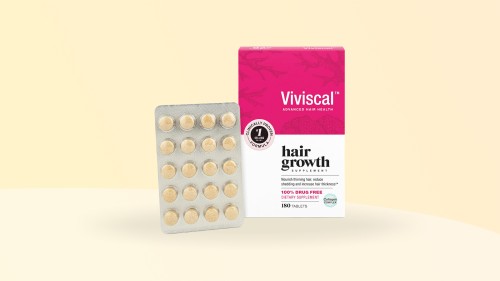Should You Take a Biotin Supplement for Hair? A Dietitian Explains
Published on March 17, 2022
Medically Reviewed by Natalie Olsen, MS, RDN
Before making a purchase, learn about the link between biotin and hair growth and if there is scientific evidence that biotin supplements are effective in treating hair loss.


Hair loss is very common, and most people want to do what they can to help slow the loss and promote new hair growth.
People with very thin or slow-growing hair may also be interested in how to help hair grow faster and thicker.
While there are many ways to support hair growth, not all of them are safe or effective, so natural treatments are often preferred.
Biotin has become a popular supplement that is widely advertised to support hair growth.
Here’s all you need to know about what biotin is, whether biotin can help with hair growth, and what you should know about supplementing with biotin.
What Is Biotin?
Biotin is a type of vitamin — also known as vitamin B7. It is an essential nutrient present in many foods, but it can also be taken as a supplement.
Since biotin is water-soluble, it is not stored in the body. So, it is important to replenish biotin sources regularly. (1)
However, your body’s gut bacteria can also help produce some biotin for your body. (2)
Foods containing protein provide the highest amounts of biotin that help meet your body’s needs.
Some of the best food sources of biotin include:
- Eggs
- Salmon and other fish
- Organ meats, especially liver
- Beef
- Almonds
- Sunflower seeds
- Sweet potatoes
As of now, there has not been enough data to establish a recommended dietary allowance (RDA) for biotin.
Instead, only an adequate intake (AI) has been created, accounting for the amount per day in micrograms.
| Adequate Intake for Biotin | |||
|---|---|---|---|
| Age | Males & Females | Pregnancy | Lactation |
| Birth–6 months | 5 mcg | ||
| 7–12 months | 6 mcg | ||
| 1–3 years | 8 mcg | ||
| 4–8 years | 12 mcg | ||
| 9–13 years | 20 mcg | ||
| 14–18 years | 25 mcg | 30 mcg | 35 mcg |
| 19+ years | 30 mcg | 30 mcg | 35 mcg |
Biotin deficiency is very rare. According to the National Institute of Health, a severe deficiency has never been reported in healthy individuals eating a varied diet.
Summary
Biotin is a type of essential vitamin present in many protein-containing foods and can also be produced by your gut bacteria. How much biotin you need depends on your life stage, and deficiency is very rare.
Does Biotin Help With Hair Growth?
Biotin helps make proteins, including the protein keratin — a major component of hair and nails. (3)
This is why hair loss — also called alopecia — is one of the main symptoms of biotin deficiency, though deficiency is rare. (4)
While biotin has become a very popular supplement for hair loss and hair growth, the scientific evidence supporting this is limited and still emerging.
A small study done on children who encountered hair loss due to taking an anti-seizure medication found that some of them experienced a reversal of this hair loss after taking 10 mg of biotin supplements daily for three months. (5)
Another study showed that taking a supplement that included biotin as an ingredient helped promote hair growth in women suffering from temporary hair thinning. (6)
However, so far, there are no published scientific studies that support the claim that high-dose biotin supplements on their own are effective in preventing or treating hair loss in most adults who do not have a biotin deficiency.
So, more studies are needed to confirm these assumptions.
Summary
Hair loss is a symptom of biotin deficiency, as it is used to make proteins that are components of hair. However, there is no scientific evidence that taking biotin supplements can help with hair growth in most adults without a biotin deficiency.
Should You Take a Biotin Supplement?
Biotin can be taken as a solo ingredient supplement but is also found in many multivitamin/multimineral supplements and B-complex vitamin supplements.
It is typically available in capsule, tablet, and liquid forms.
Though biotin deficiency is uncommon, research does support the use of biotin supplements to help reverse hair loss associated with biotin deficiency. (3)
If you suspect you have a biotin deficiency or are concerned about hair growth, it is important to talk with your doctor before taking any supplements.
You should also keep in mind that biotin supplements have not been proven to support hair growth in most individuals.
If you do choose to take a supplement, most can be taken any time of day, with or without food, but taking with food often leads to better tolerance.
Since the supplement industry is not well regulated for safety and effectiveness by the Food and Drug Administration (FDA), choosing high-quality manufacturers from reputable brands is important. (7)
Reputable brands are ones that voluntarily take part in third-party testing.
Some labels to look for on supplement bottles that indicated third-party testing include USP, NSF, Consumer Lab, & GMP. It is also often advertised on the brand’s website.
Third-party testing ensures that supplements have the right strength of ingredients, contain no contaminants, and include forms of nutrients that can be effectively absorbed by the body. They should also be free from allergens and non-GMO. (8)
Summary
Biotin supplements can help reverse hair loss when a true biotin deficiency is present, although this is very rare.
You should talk with your doctor before deciding whether to start taking biotin supplements, and be sure to purchase from reputable brands if you do choose to take them.
Related: Top Vitamin Subscription Services Compared
Are There Side Effects of Taking Biotin Supplements?
Taking biotin supplements is not known to be toxic, as there is no established upper limit for the vitamin, and your body will remove any excess in urine. (9)
Studies have found no negative side effects of taking up to 200 mg/day of oral biotin or 20 mg/day intravenously in patients.
However, taking very high doses of biotin may interfere with other lab results, specifically thyroid hormones and vitamin D levels.
Because of this, the Food and Drug Administration (FDA) released a warning that taking biotin can significantly interfere with certain lab tests and cause incorrect results that may go undetected. (10)
This is why it is crucial to tell your healthcare provider if you are taking biotin supplements, especially if you are being treated for any medical conditions.
You may also want to consider increasing biotin intake from food before considering supplement use.
Also, some medications can interact with biotin and cause lower levels in the body.
Studies have found that anticonvulsants used for preventing seizure activity are one known type of drug that can interfere with biotin levels. (11)
Summary
While biotin is not known to be toxic, taking supplements can interfere with different types of lab results, so it is important to tell your doctor about any biotin supplements you may be taking.
Frequently Asked Questions
Does biotin really help hair growth?
While there is a popular belief that biotin can help with hair growth and slow the progression of hair loss, these statements are not proven by scientific evidence.
How much biotin should I take for hair growth?
If you still decide to take biotin to support hair growth, the dosage may vary. It is best to start with a small dose of about 10 mcg/day and consider tapering up only if needed and according to a doctor's guidance.
How long does it take to see results of taking biotin supplement for hair growth?
Since biotin is not proven to help with hair growth, you may never see results from taking it as a supplement for this purpose.
If you are deficient in biotin, one scientific report found that biotin deficiency has a good outcome and that symptoms usually respond quickly with treatment (12)
The Bottom Line
Biotin is an essential vitamin that you must get from food.
While it is commonly marketed for and believed to help support hair growth, there is not any scientific proof that it can do so.
If you are concerned about hair loss, the solution that works best for you will depend on what is causing the issue in the first place.
Hair loss can be the result of many factors — genetics, age, life stage, medical conditions, hair treatments, medications, and hormonal imbalances. (13)
Therefore, it is best to talk to your doctor about other solutions for hair loss that might better support the issue.
At WellnessVerge, we only use reputable sources, including peer-reviewed medical journals and well-respected academic institutions.
- Biotin - Health Professional Fact Sheet:
https://ods.od.nih.gov/factsheets/Biotin-HealthProfessional/#h3 - Frontiers | Metabolism of Dietary and Microbial Vitamin B Family in the Regulation of Host Immunity | Nutrition:
https://www.frontiersin.org/articles/10.3389/fnut.2019.00048/full - A Review of the Use of Biotin for Hair Loss - PMC:
https://www.ncbi.nlm.nih.gov/labs/pmc/articles/PMC5582478/ - Biotin | Linus Pauling Institute | Oregon State University:
https://lpi.oregonstate.edu/mic/vitamins/biotin#deficiency - The influence of valproic acid and carbamazepine treatment on serum biotin and zinc levels and on biotinidase activity - PubMed:
https://pubmed.ncbi.nlm.nih.gov/21642615/ - A 3-Month, Randomized, Double-Blind, Placebo-Controlled Study Evaluating the Ability of an Extra-Strength Marine Protein Supplement to Promote Hair Growth and Decrease Shedding in Women with Self-Perceived Thinning Hair:
https://www.hindawi.com/journals/drp/2015/841570/ - Information for Consumers on Using Dietary Supplements | FDA:
https://www.fda.gov/food/dietary-supplements/information-consumers-using-dietary-supplements - THIRD-PARTY TESTING GUIDANCE:
https://www.usada.org/athletes/substances/supplement-connect/reduce-risk-testing-positive-experiencing-adverse-health-effects/third-party-testing-guidance/#:~:text=Third%2Dparty%20certification%20of%20dietary%20supplements%20is%20when%20an%20organization,and%20vouches%20for%20its%20quality. - Biotin – Vitamin B7 | The Nutrition Source | Harvard T.H. Chan School of Public Health:
https://www.hsph.harvard.edu/nutritionsource/biotin-vitamin-b7/ - UPDATE: The FDA Warns that Biotin May Interfere with Lab Tests: FDA Safety Communication | FDA:
https://www.fda.gov/medical-devices/safety-communications/update-fda-warns-biotin-may-interfere-lab-tests-fda-safety-communication - Impaired biotin status in anticonvulsant therapy - PubMed:
https://pubmed.ncbi.nlm.nih.gov/7181453/ - Biotin Deficiency - StatPearls - NCBI Bookshelf:
https://www.ncbi.nlm.nih.gov/books/NBK547751/ - Hair loss: Who gets and causes:
https://www.aad.org/public/diseases/hair-loss/causes/18-causes






